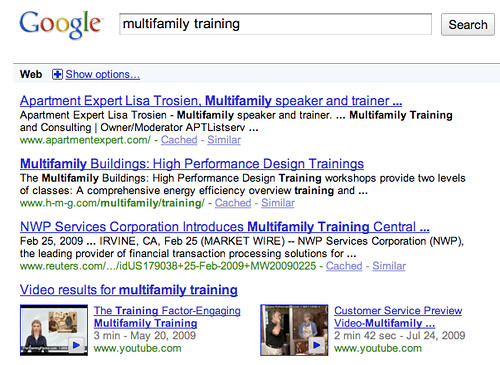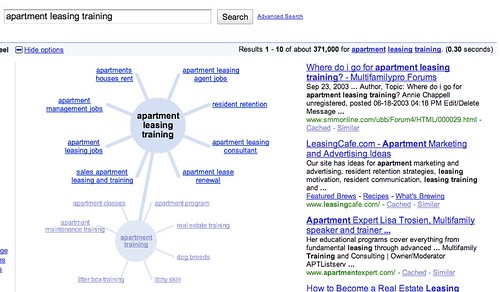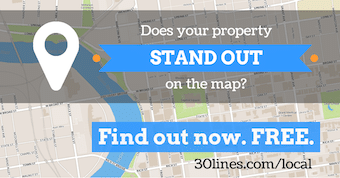Yesterday, I had a quick conversation on Twitter with Jonathan Saar from the Training Factor. He mentioned how happy he was that his site now appears on page one of Google search results for the term “multifamily training.” That’s pretty exciting, because that’s the exact business that the Training Factor is in. I’m sure it’s driving a fair number of leads for them.
Visibility matters. It’s critical that readers can find your site through search engines, but it’s just as important that you know which terms those readers are using to find you. So it’s good not only to keep an eye on the keywords that you think are important, but also other terms that are similar to the ones you think of first.
Google has a TON of great resources to help you learn more about keywords, including Google Trends, Google Insights, Google Analytics, related searches and Conversion University. One of my favorite new(er) tools is something Google calls the Wonder Wheel … it’s sort of like a mind map for related keywords.
Here’s how it works:
First, try your original search. In Jonathan’s case, here’s what his initial search would look like:

(Kudos to my #AptChat co-host Lisa Trosien for owning the #1 result! Also note that Training Factor’s YouTube videos show up in the top results, even above their own website — a great example why you should be using multimedia to increase your visibility online.)
Now, let’s see what Google thinks are some related terms. Just click “Show Options,” then click “Wonder Wheel” in the sidebar that appears on the left. Here’s what you get:

You can see that some related terms include “conservation programs,” “nwp services corporation,” “utility management” and “operational efficiencies.” If you’re writing about multifamily training, these might be a few good terms to include on your website or in blog posts (assuming that they’re relevant to your topic).
Don’t forget to try synonyms for your original search, too. Instead of “multifamily training,” Jonathan might want to try “apartment training.” A quick spin on the Wonder Wheel shows that related terms include “apartment leasing training,” “apartment maintenance training,” “apartment classes” and more. (Litter box training? Who knew?) Keep digging, and watch the Wonder Wheel expand quickly to discover new subjects. Here’s an example:

As you can see, you can use Wonder Wheel to easily find terms that are related to your original search. If you’re blogging or maintaining a website, this can be an excellent way to discover popular terms and brainstorm new topics for future blog posts. So take the Wonder Wheel for a spin. You might be surprised at what you find.
Have you tried Wonder Wheel? Has it helped you? What other tools are you using for keyword analysis?
UPDATE: (July 2011) It appears that Google has disabled the Wonder Wheel in their latest redesign. We’ll keep you posted if we see that Google brings it back in the future. (We sure hope they do!)




Thanks for sharing Mike. It's much different getting results from the Wonder Wheel than from doing related keyword searches within an AdWords account. Very interesting.
Thanks for dropping by, Mark. I always look to multiple resources to help with keyword research, and Wonder Wheel is a quick way to do some exploring of related terms. Glad you found it helpful … let me know if it helps you with your blogging or your websites.
Thanks for sharing Mike. It's much different getting results from the Wonder Wheel than from doing related keyword searches within an AdWords account. Very interesting.
Thanks for sharing Mike. It's much different getting results from the Wonder Wheel than from doing related keyword searches within an AdWords account. Very interesting.
GREAT blog, Mike. Every article is compelling reading. I’ve been around on the net a long time, and I’m learning all kinds of things! As Mark says, very different (and in some ways more useful) results than the Adwords keyword tool. I’ve just spent hours tweaking my site’s keywords. Wish I’d known about Wonder Wheel first!
Thanks, Pam! You’ll find that there are lots of great ways to find keywords relevant to your business. One other thing I really like to do is look at what people are searching for *on* my site — that gives me some indication of what they’re expecting to find, so I know exactly what to create next. Good luck!